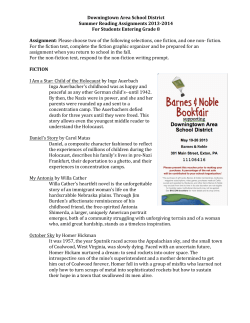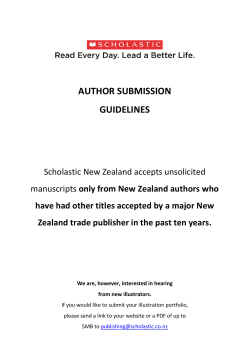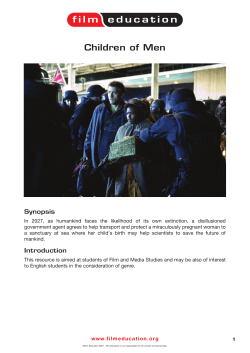
Writers in Paris Fiction Craft Seminar Instructor: Darin Strauss
Writers in Paris
Fiction Craft Seminar
Instructor: Darin Strauss, Clinical Associate Professor
COURSE DESCRIPTION
This class will teach you to read as a writer, and to write as a reader. (It may
dampen, a bit, the naive joy of reading for pleasure).
We'll use outside texts to answer elemental questions of story telling. And we'll
look at things that lit classes don't: how to begin a story, say; how to introduce a
character. And we'll take up such questions as, “What is the relationship of plot to
sub-‐plot? How does one hold the reader's attention?”
Of course, in Art, rules must be flexible—but I ask my students to think of writing
in strategic terms; each story-‐telling decision needs to make tactical sense. With
that in mind, we'll examine—with so much esprit de corps as to arouse envy—the
tenets of the Art of Fiction.
LEARNING OUTCOMES
Students who successfully complete this course will be able to:
● Describe and analyze what works (and what doesn’t) in published works of
fiction.
● Critically examine their own writing.
● In writing and discussion, reflect on the various aspects of the craft of
fiction—character and plot development, prose effectiveness, and
theme—in the work of their peers.
● Develop new ways of looking and thinking about texts and their own work.
● Formulate an informed level of analysis based on a comprehensive
understanding of the writing of fiction.
● Critically examine and compare the similarities in composition between
novels and student work.
TEACHING & LEARNING METHODOLOGIES
This is a discussion class.
I will lead discussions—if not lecture—about the assigned readings. The analysis
of student work – as exercises -‐-‐ will be more democratic, with my voice being
only one (the final one, usually) among those of the entire class.
Grades are based on oral participation, the completion of written assignments,
written critiques, revision, and attendance. If you show up and talk about the
books you've read—and if you hand in your work on time, and
thoughtfully—you'll do well. If you don't, then you'll certainly do poorly.
GRADING MATRIX
Completion of in-‐class exercises
You will need to do in-‐class work, and be ready to discus it.
Attendance
Showing up for class is a third of your grade. If you miss class, you will not do
well, no matter what you do when you are present.
Oral Participation
This course will float on student discussion. A sixth of your grade will be
dependent upon your talking in class.
Written Critiques
Students will be expected to offer written analysis of outside work. This will also
make up a sixth of the grade.
Revisions and Final Paper
Students will be expected to revise their work, based on the class discussion, and
to write a final paper. Together, these will make up the final thirty-‐three percent
of the grade.
This class has a strict no-plagiarism policy. One strike and you fail. The nature of
plagiarism in fiction writing is similar to the nature of plagiarism in expository
writing; stealing somebody else’s work will not be tolerated. All the same, there is
room, in creative work, for the student to be influenced. We will discuss in class.
Suffice it to say, any verbatim use of other work will eb considered plagiaristic.
ASSIGNMENT DATES
On the last day of class, students will hand in a final paper, examining -‐-‐ on a craft
level -‐-‐ two or more of the published works discussed in class. This will differ
from a standard lit class final paper in that the students will address a
nuts-‐and-‐bolts storytelling
technique ("How Lorrie Moore and Jhumpa Lahiri differ in their approach to
building character," for example.) This paper will be from 5 to 10 pages long.
BOOK LIST
● Remains of the Day by Kazuo Ishiguro
● A Moveable Feast by Ernest Hemingway
● Course Reader available for purchase at a local copy shop in Paris (TBA)
READING SCHEDULE
Class 1) Barthleme's "The School," Saunders essay on "The School." (This will be
read in class.)
Class 2) Raymond Carver's "What We Talk About When We Talk About Love."
Class 3) V.S. Pritchett "The Saint." (This will be read in class)
Class 4) Lorrie Moore: "People Like That Are The Only People Here"; "And You're
Ugly, Too"
Class 5) V.S. Pritchett: "The Diver" (This will be read in class)
Class 6) Hemingway, “A Moveable Feast”; David Foster Wallace: “Oblivion”
Class 7) Jhumpa Lahiri: "Interpreter of Maladies"; "Sexy"
Class 8) Kazuo Ishiguro: Remains of the Day
COURSE ASSIGNMENTS
1) Students will be designated "discussion leaders" for the fiction that's on the
reading schedule. Each student, therefore, will have to work with a partner (or
partners) to guide the discussion for a single class session.
2) A final paper, examining -‐-‐ on a craft level -‐-‐ two or more of the works
discussed in class. This will differ from a standard lit class final paper in that the
students will address a nuts-‐and-‐bolts storytelling technique ("How Lorrie Moore
and Jhumpa Lahiri differ in their approach to building character," for example.)
3) For the stories and/or novels that aren't read in class, each student will be
required to submit a very brief response: no more than a paragraph, summarizing
what you thought was effective (or ineffective) about each.
These stories will be contained in a course packet
DAILY AND WEEKLY COURSE OUTLINE
The topics covered will vary based on issues that come up in student work. But, a
basic framework: We will begin with beginnings, move on to plot and character,
and then finish up with the power of influence and revision.
© Copyright 2025





















